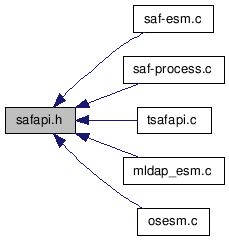
Definition in file safapi.h.
This graph shows which files directly or indirectly include this file:

Go to the source code of this file.
| #define safadmin_argtbl SafAdminArgTbl |
Old name for struct SafAdminArgTbl
| #define Safadmin_Argtbl SafAdminArgTbl |
Old name for type SafAdminArgTbl
| typedef struct safpb_parameter_block Safpb_Parameter_Block |
ESF "SAFROUTE" API Parameter Block.
This parameter block is the sole parameter to most of the ESF API calls: Verify, Auth, etc. The caller creates and initializes the parameter block, then passes its address to the SAFROUTE function.
On input the caller should have set the global fields marked "IN" and "IN/OUT", such as safpb_parameter_block::safpb_version, and those fields in the structure associated with the request type (safpb_parameter_block::VERIFY for a Verify call, and so forth).
For example, in C:
#include "safapi.h" Safpb_Parameter_Block VerifyReq = {0}; VerifyReq.safpb_version = saf78_VERSION_1; VerifyReq.safpb_request = saf78_REQUEST_VERIFY; VerifyReq.safpb_type = saf78_TYPE_ENVIR_CREATE; VerifyReq.safpb_codeset = saf78_CODESET_UTF8; VerifyReq.REQUESTS.VERIFY.safpb_verify_USERID_len = strlen(UserID); VerifyReq.REQUESTS.VERIFY.safpb_verify_PWRD_len = strlen(Password); VerifyReq.REQUESTS.VERIFY.safpb_verify_USERID_ptr = UserID; VerifyReq.REQUESTS.VERIFY.safpb_verify_PWRD_ptr = Password; SAFROUTE(&VerifyReq);
On return, the fields marked "OUT" and "IN/OUT" will have been populated by ESF Manager, for a successful call. If an error occurred, some fields may not have been populated.
There are three fields for returning error information:
Various combinations of API return code, manager return code, and reason code are listed in ESF API Return Codes.
If an ESM Module triggered the failure, the safpb_parameter_block::safpb_safesm_index field will be set to the index, starting from 1, of the failing module in the ESM Module list configured for the failing component (ES server or MFDS).